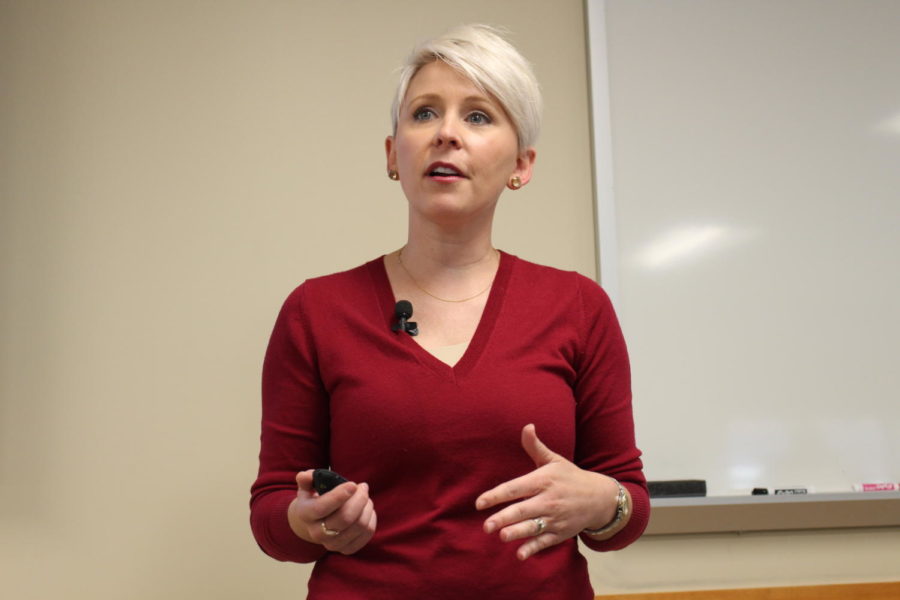Kirsten Anderson aims to end harassment through education during First Amendment Days
April 11, 2018
Kirsten Anderson is on a mission: ending workplace harassment through education.
“You have the opportunity to make a real difference on culture change in the workplace,” said Anderson. “You guys are pretty powerful.”
Anderson opened her First Amendment Day session with talking about one particular day in her life. On May 17, she filed a complaint outlining the ‘toxic work environment’ where she worked: the Iowa State Capitol.
This was Anderson’s fourth complaint. After she submitted the memo to her boss, she was fired. She then sued the state for retaliation, wrongful termination and sexual harassment in the workplace.
Anderson covered four ways to get started in helping end workplace harassment:
- Recognize what’s happening
- Know your recourse
- Do some research
- Consult a professional
Anderson attended Northwest Missouri State University and graduated with a degree in broadcast journalism. When she graduated, she got a job with a senator in Kansas City, and talked about how she was liked and respected in her small office. She later became the Communications Director for the Iowa Senate Republicans and worked in the statehouse in Des Moines.
While the things that happened at the statehouse seemed minor, the comments and incidents got worse as time went on. After a day of debating legislature, Anderson went to dinner with two male co-workers. The conversation turned to sex lives, and the men wanted personal details about Anderson.
“Everyone on staff was treated this way,” Anderson said. “The legislators who make our laws would participate in this.”
After a legislator, a known alcoholic, returned from lunch drunk and began yelling at Anderson in front of her boss and co-workers, she knew that no one was going to help her stop it. When she dug out her policy manual to look into harassment policies, she noticed that the pages on harassment were incorrectly photocopied; they weren’t there.
After talking to others, she learned that other employee manuals were the same way.
“We had a problem,” Anderson said. “A widespread problem.”
After another legislator made disparaging comments about a female senator, Anderson went to her boss and filed a second complaint; her boss did nothing. So, Anderson did research, after talking to her co-workers further, she discovered that her problem was office-wide.
“Employers need to know if they have an epidemic on their hands,” Anderson said. “The workplace bullying institute has put a price tag on lost wages- it’s $8,800 per victim, and you better believe that employers don’t want that on their hands.”
Anderson suggested talking to professionals and consulting human resources at one’s employer. At the statehouse, the HR representative was at the will of the majority party; Anderson says that should not be.
“Harassment is nonpartisan,” Anderson said.
After a third complaint, Anderson went to a lawyer. Her lawyer told her that the state wouldn’t fire her; when they did, he told her to come to his office, and they researched how to sue the state of Iowa.
“In a court of law, you need to prove that this [sexual harassment] is happening,” Anderson said. “And it is very hard to do.”
Most of Anderson’s co-workers are still at the capitol, but they corroborated her information and testified on her behalf in court, helping her prove that the environment was ‘severe and pervasive.’ After a weeklong trial, she won her case.
Anderson then covered a few more ways to stand up against and prevent workplace harassment, from intervening in situations where others may be in trouble to documenting any and all instances that may be questionable to simply knowing harassment policies at a job.
“I worked at the capitol for five years, and most of that time, I was constantly harassed. What do you think that does to a person’s mental state?” Anderson said. “It affects everything- for a year, I cried everyday, and I knew I couldn’t go on like that.”
Now that she is out of the Capitol, Anderson said that she is now a rock for one of her female co-workers, as well as a rock for other women who may be in her situation or have been in her situation. She also emphasized a difference between moving on and moving forward- instead of forgetting that something happened and sweeping it under the rug, she said to start conversations with friends and family about harassment, as well as demanding more from bosses and co-workers.
“Change happens when it’s top-down,” Anderson said. “Change happens when our leaders are walking the walk and not just talking the talk. Disconnected leaders do not make a good work environment.”
Closing her session, Anderson reflected on the kindness of a lobbyist who always stopped to engage with her during her time at the capitol, and challenged the audience to expand the conversation and lift each other up, emphasizing women being one another’s support system.
“It’s everywhere. It’s pervasive,” Anderson said. “Let’s talk about it.”







